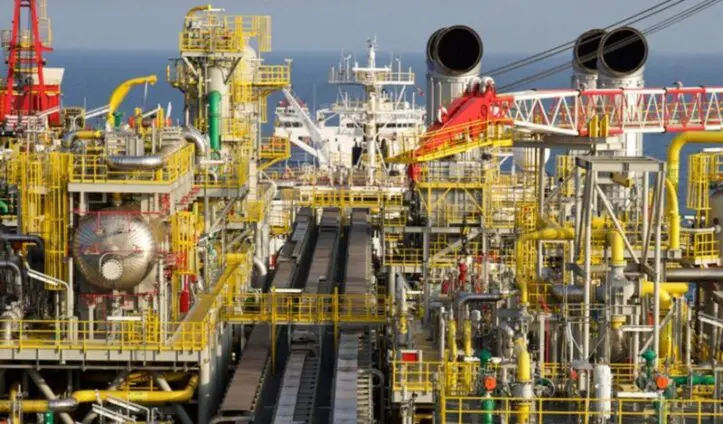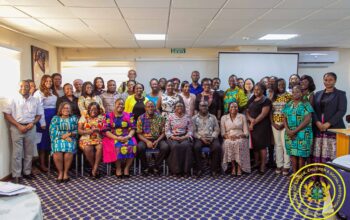The Petroleum Commission (PC) of Ghana has awarded contracts worth over $3.6 billion to Indigenous Ghanaian Companies (IGCs), according to Kwaku Boateng, the Director of Local Content. This announcement highlights the commission’s commitment to promoting local participation and empowerment within the country’s oil and gas sector.
The move is part of Ghana’s broader efforts to ensure that local companies play a significant role in the development of the petroleum industry, creating opportunities for indigenous businesses to thrive and contribute to the economy. By awarding these contracts, the Petroleum Commission is reinforcing the importance of local content and supporting the growth of Ghanaian companies in a competitive global market.
This development is a positive step towards fostering a more sustainable and inclusive oil and gas industry in Ghana, encouraging further investment in local capabilities and strengthening the nation’s position in the sector.
Kwaku Boateng, the Director of Local Content at the Petroleum Commission (PC) in Ghana, recently highlighted significant developments in the country’s oil and gas sector. Over $3.6 billion worth of contracts have been awarded to Indigenous Ghanaian Companies (IGCs), while foreign companies have secured contracts worth about $8.7 billion. Additionally, $6.3 billion worth of contracts have been awarded to Joint Ventures (JVs).
Beyond the financial figures, Mr. Boateng also reported that more than 10,000 direct jobs have been created as a result of local content development in the petroleum upstream activities in Ghana. This growth in employment is a testament to the increasing involvement of local businesses and workers in the oil and gas industry.
Key investments in the country include the establishment of critical infrastructure such as cementing units, waste management and thermal absorption plants, fabrication facilities, hydraulic and engineering facilities, aviation hangars, and bolts and nut manufacturing coating plants. Additionally, there has been investment in chemical blending and the creation of training centres for specialized trades, all contributing to the strengthening of local capacity and expertise in the sector.
Mr. Boateng provided these details during his presentation on “Building value and promoting investment through local content” at the recently concluded Ghana Energy Week in Takoradi, Western Region, under the auspices of the Western Regional Coordinating Council. His remarks underscore the government’s commitment to fostering local participation in the oil and gas sector and ensuring that more benefits stay within the country.Top of Form
At the recently concluded Ghana Energy Week in Takoradi, Kwaku Boateng, the Director of Local Content at the Petroleum Commission, delivered a key speech on the theme: “Renaissance of Ghana’s energy; the renewed commitment towards inclusive and sustainable energy transition, decarbonisation, and energy poverty history for economic development.”
During his address, Mr Boateng emphasized the importance of sustainable management of Ghana’s oil resources as a crucial factor for the country’s socio-economic development. He stressed that the Petroleum Commission is dedicated to ensuring transparency, cooperation, development, and growth within the sector, ensuring that the benefits from the petroleum industry are shared mutually among all stakeholders, particularly the people of Ghana.
He further assured that Ghana is committed to providing the right enabling environment for investment in the upstream petroleum sector by enacting appropriate laws, regulations, and guidelines that will govern the industry effectively.
In outlining strategies to promote investment, Mr Boateng highlighted key initiatives:
Intensified government investment promotion to stimulate more activity in the sector.
Enhanced local content development by increasing local participation in the oil and gas industry.
Activation of incentive provisions (Regulation 25 of LI 2204) to encourage technological development in the sector, which is crucial for long-term growth and competitiveness.
These strategies are designed to attract more investment and ensure that Ghana’s energy sector is sustainable, inclusive, and beneficial to the broader population, driving both economic growth and energy security.
overmen, he shared plans to encourage in-country spending to keep resources within the economy. Empower local businesses through strategic alliances and partnerships. Support the incubation of Indigenous Ghanaian Companies (IGCs) by larger oil companies. Promote supplier development through subcontracting, enabling smaller companies to grow within the sector.
Mr Boateng also emphasized that the focus should be on domestic value creation rather than ownership, with a keen focus on tackling critical issues such as access to financing, establishing a Local Content Fund, and increasing infrastructure. He mentioned the rehabilitation of Tema Shipyard as one of the key infrastructure projects aimed at boosting Ghana’s capabilities in shipbuilding and repair, contributing to the overall growth of the sector.
These efforts are designed to foster a more sustainable, inclusive, and growth-oriented petroleum industry in Ghana, benefiting local businesses, workers, and the economy at large.
In his speech, Kwaku Boateng, the Director of Local Content at the Petroleum Commission, addressed several challenges facing the development of local content in Ghana’s petroleum sector. He identified the following key issues:
Low level of activities within the sector that hinder local content growth. Limited local capacities in key technical areas, affect the ability of local businesses to fully engage in the oil and gas industry. The lack of key infrastructure necessary to support the development of local content, such as manufacturing facilities and specialized equipment. Overlapping policies and regulations from other sectors, can create confusion and hinder progress in the petroleum industry. The absence of a wider strategic plan in trade and industry to complement local content regulations. High cost of capital, which makes it difficult for local businesses to compete and invest in the sector. Issues like fronting (where foreign companies disguise local ownership to avoid local content requirements) and a weak manufacturing and industrial base, limits the potential for local businesses to scale up.
Despite these challenges, Mr. Boateng pointed out that many emerging countries have successfully used local content as a “driver of transition” for growth and economic development. He explained that the goal of local content policies is to maximize national value creation along the entire petroleum value chain.
According to Mr Boateng, key objectives include:
Workforce development should create both direct and indirect employment opportunities for host communities through local procurement and the establishment of new businesses. Strengthening supply chains to ensure that local companies can fully participate in the sector. Economic development by increasing the country’s Gross Domestic Product (GDP) through value retention in-country, stimulating growth in non-core businesses, and fostering stronger linkages and infrastructure development across various industries.
Mr. Boateng’s remarks emphasize the importance of addressing these challenges through strategic planning and targeted investments to ensure that the petroleum sector becomes a significant engine for sustainable economic development in Ghana.









